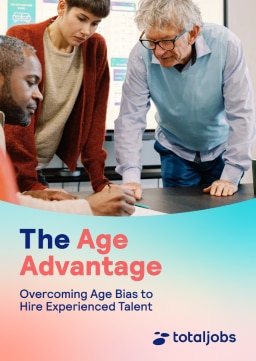
Why hiring older employees can benefit your organisation
Table of Contents
- 1. Knowledge transfer
- 2. Leadership capabilities
- 3. Industry expertise
- 4. Problem-solving skills
- 5. Workforce diversity and inclusion
- 6. Employee retention
- The advantage of older talent

The Age Advantage
Age bias is an increasing challenge for UK jobseekers, with nearly three in five recruiters admitting to making assumptions about candidates based on age. In fact, 15% of candidates over the age of 50 have been turned down for a job explicitly because of their age.
15%
of candidates over 50 have been rejected from a job explicitly because of their age.
These findings come from our research into ageism in the recruitment process, which draws on insights from 4,000 jobseekers, 1,000 HR decision-makers, and an analysis of over 4.5 million job ads.
In this article, we’ll explore six key advantages of onboarding older workers and building an age-inclusive workforce that appreciates their contributions.
1. Knowledge transfer and mentorship
Older workers bring a wealth of experience accumulated over their careers. This gives them the ability to pass on their knowledge to younger employees through mentorship.
With many UK organisations grappling with skills gaps, older employees can offer invaluable insights to equip the next generation with essential skills for long-term success. Whether through formal or informal mentoring initiatives, these employees facilitate individual growth while strengthening team-wide competencies.
However, it’s important to recognise a common issue: around 27% of jobseekers over 50 feel “old” compared to their peers, and 25% avoid applying for jobs due to this perception. Addressing this bias and fostering an age-inclusive workplace ensures your organisation doesn’t miss out on the mentorship and experience that older employees can offer.
2. Leadership capabilities
Building on their mentorship capabilities, older employees often demonstrate strong leadership qualities developed over years of life and work experience. This allows them to provide valuable guidance that fosters a positive environment and helps shape a resilient workforce.
As a result, by hiring older workers, your organisation can look to benefit from:
- Crisis management skills: Older employees, having navigated numerous professional challenges, are well-equipped to manage crises.
- Strong communication: With experience working in diverse teams, older workers excel at promoting teamwork and ensuring all voices are heard.
- Empathy and understanding: Having been in the shoes of less experienced hires, older employees are well-placed to support new starters, making the onboarding process smoother.
- Prior leadership experience: Many older workers have held senior positions, allowing them to drive productivity and contribute to a positive workplace culture.
3. Industry expertise
Hiring older employees offers your organisation access to a wealth of industry knowledge that can be hard to replicate. This experience can boost success across critical areas by harnessing:
- Real-world experience: While educational programmes play an important role, they can’t replace the insights gained from real-life scenarios. Older workers bring a depth of understanding that comes from years of navigating industry complexities.
- Informed decision-making: Their ability to see the bigger picture and anticipate long-term effects allows older employees to offer valuable perspectives during strategic planning and decision-making.
So, by embracing the industry-specific expertise that older employees bring as part of a multigenerational workforce, you can enhance your organisation’s strategic outlook and operational effectiveness, and contribute to sustainable growth.
4. Problem-solving skills
Given the wealth of knowledge and experience they bring with them, older employees can significantly improve problem-solving capabilities within your workforce, often challenging the misconception that they may struggle to adapt to new technology.
Our research indicates that 56% of recruiters express concerns about older candidates’ tech abilities. However, this overlooks the fact that technological skills can be taught and that workers over 50 are often just as committed to lifelong learning as their younger counterparts.
While older employees can quickly acquire the necessary tech skills, they already bring strong problem-solving abilities developed through years of experience. Their mature perspective enables them to tackle challenges effectively and creatively, providing valuable support to younger workers who may feel overwhelmed.
5. Workforce diversity and inclusion
Workplace diversity greatly impacts productivity, culture, and profitability, and age diversity is just as essential as diversity in education, socioeconomic background, and culture.
By working to overcome age discrimination in the recruitment process and build a multigenerational, age-inclusive workforce, you can benefit from:
- Diverse perspectives: Older employees contribute unique insights from their long careers, enabling them to approach challenges differently and fostering innovation.
- Better understanding of customer needs: A multigenerational workforce is better equipped to understand and serve an older customer demographic, enhancing your organisation’s ability to meet their needs.
Although nearly all recruiters focus on cultural fit, 47% acknowledge that age plays a significant role in assessing this. This bias may cause your organisation to overlook valuable older candidates who can enhance workplace culture and bring diverse experiences to the table.

Reading tip
The multigenerational workforce: Benefits, challenges and best practices
6. Employee retention
Hiring older employees can significantly improve retention rates. Our research shows that 55% of older workers are more likely to remain with their current employer, making them less inclined to pursue new job offers.
This loyalty is crucial for reducing turnover costs, retaining institutional knowledge, and maintaining a stable workforce. Moreover, older employees tend to prioritise meaningful work, seeking roles that offer purpose and satisfaction, which contributes to higher job satisfaction and team morale.
Interestingly, our findings show that a large proportion of individuals over 60 express a desire to continue working beyond retirement age. In fact, 75% of older workers are open to remaining in the workforce, with 51% citing flexible working hours as an incentive to work beyond the age of 66.
This dedication and focus help foster a culture of stability and continuity, ultimately enhancing retention and contributing to long-term organisational success.
75%
of workers over the age of 50 are open to remaining in the workforce beyond retirement age, given the right incentives.
The strategic advantage of embracing older talent
Embracing older workers can improve organisational resilience and unlock significant economic potential. In fact, according to the Centre for Ageing Better, giving older workers fair access to the labour market could boost the UK economy by £9 billion a year, while improving the gap in employment rates between older and younger workers could net an additional £1.6 billion a year in income tax and national insurance contributions
As a result, by actively fostering an age-inclusive workforce, you can not only strengthen your workforce but also contribute to a more dynamic and sustainable future for your organisation and the wider economy.

Unlock the age advantage
Discover how to overcome age bias, tap into experience, and build stronger teams in our report The Age Advantage: Overcoming Age Bias To Hire Experienced Talent.
Explore articles
Receive the latest recruitment resources and
advice to boost your hiring
By providing us with your details you agree to our privacy policy and for us to keep you updated with the latest news, events,
and special offers from Totaljobs.






